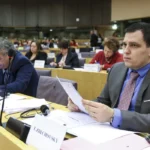At the end of the European Space Summit in Seville on November 6 and 7, the launcher crisis remains acute, but the Europeans have mapped out the technological and industrial future of a space Europe with ambitious views for the climate and the environment, believes, in a column in “Le Monde”, Philippe Baptiste, president of the National Center for Space Studies.
The European Space Summit in Seville, which ended on Tuesday November 7, made it possible to agree on ambitious objectives, particularly around the use of space for the climate and for environmental preservation. He also answered two fundamental questions asked by the President of the Republic in 2022 in Toulouse: what is Europe’s ambition in terms of exploration? What is the future of European launchers Ariane and Vega?
Europe, a space leader in the field of Earth observation, has major programs, such as Copernicus, which provides valuable satellite data for our environment. For decades, European satellites have been continuously scanning the Earth, and it is thanks to them that we can measure and understand changes in the climate, our environment and biodiversity.
To respond concretely to climate change, the National Center for Space Studies [CNES] also created the Space for Climate Observatory. With forty-four international partners, we combine spatial data with in situ observations in order to produce analysis and simulation tools that allow populations to adapt locally to climate change.
We implement simple solutions which make it possible, for example, to assess water resources, follow the coastline or control the risks of coastal submersion. In Seville, Europe made these issues a strong political priority, which will allow it to maintain its scientific, technical and industrial leadership.
European autonomy strengthened
The European Union [EU] has also focused on the space race, and space Europe has been able to overcome its contradictions and rivalries by reinventing itself at a key moment in its history. At a time when SpaceX is insisting that its Starship will make “humanity a multi-planetary species”, India, for its part, successfully landed Chandrayaan-3, while China sent a crew of young astronauts towards their space station. These ambitions, sometimes excessive, remind us how geostrategic issues are inherent to space exploration.
This article is originally published on lemonde.fr






